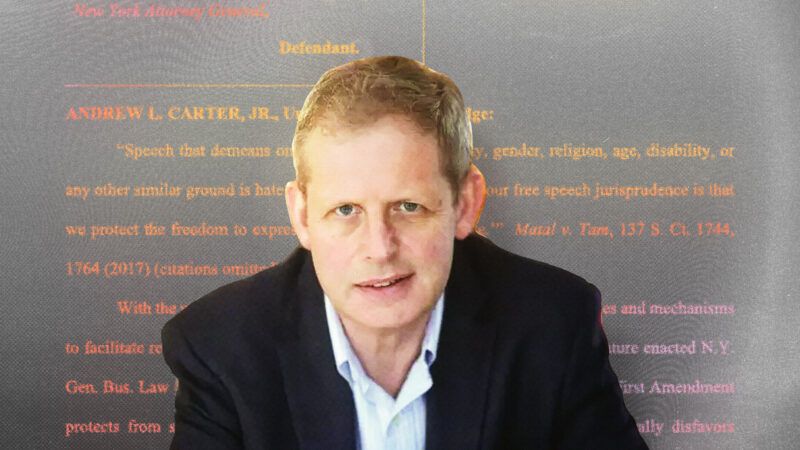District Court Halts New York Law Forcing Online Platforms To 'Respond' to 'Hateful' Speech
"Today's decision is a victory for the First Amendment that should be celebrated by everyone who hopes to see the internet continue as a place where even difficult and contentious issues can be debated and discussed freely," said one attorney.

A New York law requiring that social media companies publish official policies for reporting and responding to "hateful" conduct has been halted with a preliminary injunction after a New York district court sided with the plaintiffs in a lawsuit challenging the law on First Amendment grounds.
"New York tried to single out particular ideological viewpoints by requiring me and other platform operators to have policies for dealing with those viewpoints," plaintiff Eugene Volokh said in a Wednesday press release. "That's just as unconstitutional as the government targeting 'unpatriotic' speech or anti-police speech or whatever else."
In June, New York Gov. Kathy Hochul signed an amendment to existing business regulations, titled "Social Media Networks; Hateful Conduct Prohibited," into law. It was intended to reduce online "hateful conduct"—which it defines as "the use of a social media network to vilify, humiliate, or incite violence against a group or a class of persons on the basis of race, color, religion, ethnicity, national origin, disability, sex, sexual orientation, gender identity or gender expression."
The law requires that social media platforms, defined very broadly, create a system for users to report instances of "hateful conduct." Further, these platforms are required to develop and publish formal policies showing how they will "respond and address" the reports. Failing to comply with the law garners a $1,000 fine per day.
Last December, First Amendment nonprofit the Foundation for Individual Rights and Expression filed a lawsuit on behalf of Rumble and Locals, two online platforms affected by the law, as well as Eugene Volokh, UCLA law professor and author of the blog The Volokh Conspiracy (which is hosted by Reason). The suit argued that the law violated the First Amendment by compelling the speech of online platforms and engaging in viewpoint discrimination by signaling out "hateful" speech. The lawsuit also claimed that the law was overly broad and vague.
"New York cannot justify such a sweeping regulation of protected speech. The [law] violates the First Amendment because it burdens the publication of speech based on its viewpoint, unconstitutionally compels speech, and is overbroad," reads the lawsuit. "For at least the last several years, New York policymakers have tried to compel online services to chill, prohibit, or remove online speech disfavored by the state."
On Tuesday, a judge from the U.S. District Court of the southern district of New York agreed, granting a preliminary injunction blocking New York's law.
"The First Amendment protects from state regulation speech that may be deemed 'hateful' and generally disfavors regulation of speech based on its content unless it is narrowly tailored to serve a compelling governmental interest," wrote Judge Andrew L. Carter Jr. "The Hateful Conduct Law both compels social media networks to speak about the contours of hate speech and chills the constitutionally protected speech of social media users, without articulating a compelling governmental interest or ensuring that the law is narrowly tailored to that goal."
"We're glad that the court agreed with us that the statute is unconstitutional," Volokh told Reason. "What made it particularly clear cut is the statute was so overtly viewpoint-based. The statute said that social media platforms, which is broad enough to include us as a blog hosting comments, have an obligation to post a policy related to so-called hateful conduct…. All that's viewpoint-based. That's an attempt to use the coercive power of the law to pressure platforms or to get platforms to restrict user speech based on its viewpoint."
This legal victory sends a clear message to New York and any other state who wants to compel online platforms to regulate speech that the state government finds distasteful. Even if offensive, "hateful conduct" is protected by the First Amendment, and online platforms can't be forced to "respond and address" it.
"New York's vague and overbroad law sought to stifle robust debate on the internet," said FIRE attorney Daniel Ortner in the press release. "Today's decision is a victory for the First Amendment that should be celebrated by everyone who hopes to see the internet continue as a place where even difficult and contentious issues can be debated and discussed freely."


Show Comments (16)